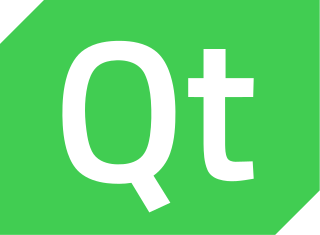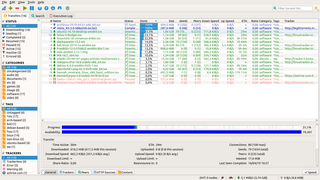
Blitz BASIC is the programming language dialect of the first Blitz compilers, devised by New Zealand-based developer Mark Sibly. Being derived from BASIC, Blitz syntax was designed to be easy to pick up for beginners first learning to program. The languages are game-programming oriented but are often found general-purpose enough to be used for most types of application. The Blitz language evolved as new products were released, with recent incarnations offering support for more advanced programming techniques such as object-orientation and multithreading. This led to the languages losing their BASIC moniker in later years.

Qt is a widget toolkit for creating graphical user interfaces as well as cross-platform applications that run on various software and hardware platforms such as Linux, Windows, macOS, Android or embedded systems with little or no change in the underlying codebase while still being a native application with native capabilities and speed.
In software engineering, a project fork happens when developers take a copy of source code from one software package and start independent development on it, creating a distinct and separate piece of software. The term often implies not merely a development branch, but also a split in the developer community; as such, it is a form of schism. Grounds for forking are varying user preferences and stagnated or discontinued development of the original software.

Git is software for tracking changes in any set of files, usually used for coordinating work among programmers collaboratively developing source code during software development. Its goals include speed, data integrity, and support for distributed, non-linear workflows.
In software development, distributed version control is a form of version control in which the complete codebase, including its full history, is mirrored on every developer's computer. Compared to centralized version control, this enables automatic management branching and merging, speeds up most operations, improves the ability to work offline, and does not rely on a single location for backups. Git, the world's most popular version control system, is a distributed version control system.
The following is a comparison of version-control software. The following tables include general and technical information on notable version control and software configuration management (SCM) software. For SCM software not suitable for source code, see Comparison of open-source configuration-management software.

qBittorrent is a cross-platform free and open-source BitTorrent client.

In computing, Puppet is a software configuration management tool which includes its own declarative language to describe system configuration. It is a model-driven solution that requires limited programming knowledge to use.
An embedded database system is a database management system (DBMS) which is tightly integrated with an application software; it is "embedded in the application". It is actually a broad technology category that includes
An open-source bounty is a monetary reward for completing a task in an open-source software project.

Frogatto & Friends is a platform game with adventure elements released in July 2010. The game received positive reviews, particularly for its "gorgeous" pixel art. The game is cross-platform and runs on Linux, AmigaOS4, AROS, Mac OS X, Microsoft Windows, iOS and BlackBerry Tablet OS. The game uses an open-source engine, with game data mostly proprietary and partly under Creative Commons BY license.
Plastic SCM is a cross-platform commercial distributed version control tool developed by Códice Software Inc. It is available for Microsoft Windows, Mac OS X, Linux, and other operating systems. It includes a command-line tool, native GUIs, diff and merge tool and integration with a number of IDEs. It is a full version control stack not based on Git.

ERPNext is a free and open-source integrated Enterprise Resource Planning (ERP) software developed by Frappé Technologies Pvt. Ltd. and is built on MariaDB database system using Frappe, a Python based server-side framework.

Visual Studio Code is an Integrated Development Environment (IDE) made by Microsoft for Windows, Linux and macOS. Features include support for debugging, syntax highlighting, intelligent code completion, snippets, code refactoring, and embedded Git. Users can change the theme, keyboard shortcuts, preferences, and install extensions that add additional functionality.
Perforce, legally Perforce Software, Inc., is an American developer of software used for developing and running applications, including version control software, web-based repository management, developer collaboration, application lifecycle management, web application servers, debugging tools and Agile planning software.

DBeaver is a SQL client software application and a database administration tool. For relational databases it uses the JDBC application programming interface (API) to interact with databases via a JDBC driver. For other databases (NoSQL) it uses proprietary database drivers. It provides an editor that supports code completion and syntax highlighting. It provides a plug-in architecture that allows users to modify much of the application's behavior to provide database-specific functionality or features that are database-independent. This is a desktop application written in Java and based on Eclipse platform.
Microsoft, a technology company known for its opposition to the open source software paradigm, turned to embrace the approach in the 2010s. From the 1970s through 2000s under CEOs Bill Gates and Steve Ballmer, Microsoft viewed the community creation and sharing of communal code, later to be known as free and open source software, as a threat to its business, and both executives spoke negatively against it. In the 2010s, as the industry turned towards cloud, embedded, and mobile computing—technologies powered by open source advances—CEO Satya Nadella led Microsoft towards open source adoption although Microsoft's traditional Windows business continued to grow throughout this period generating revenues of 26.8 billion in the third quarter of 2018, while Microsoft's Azure cloud revenues nearly doubled.









